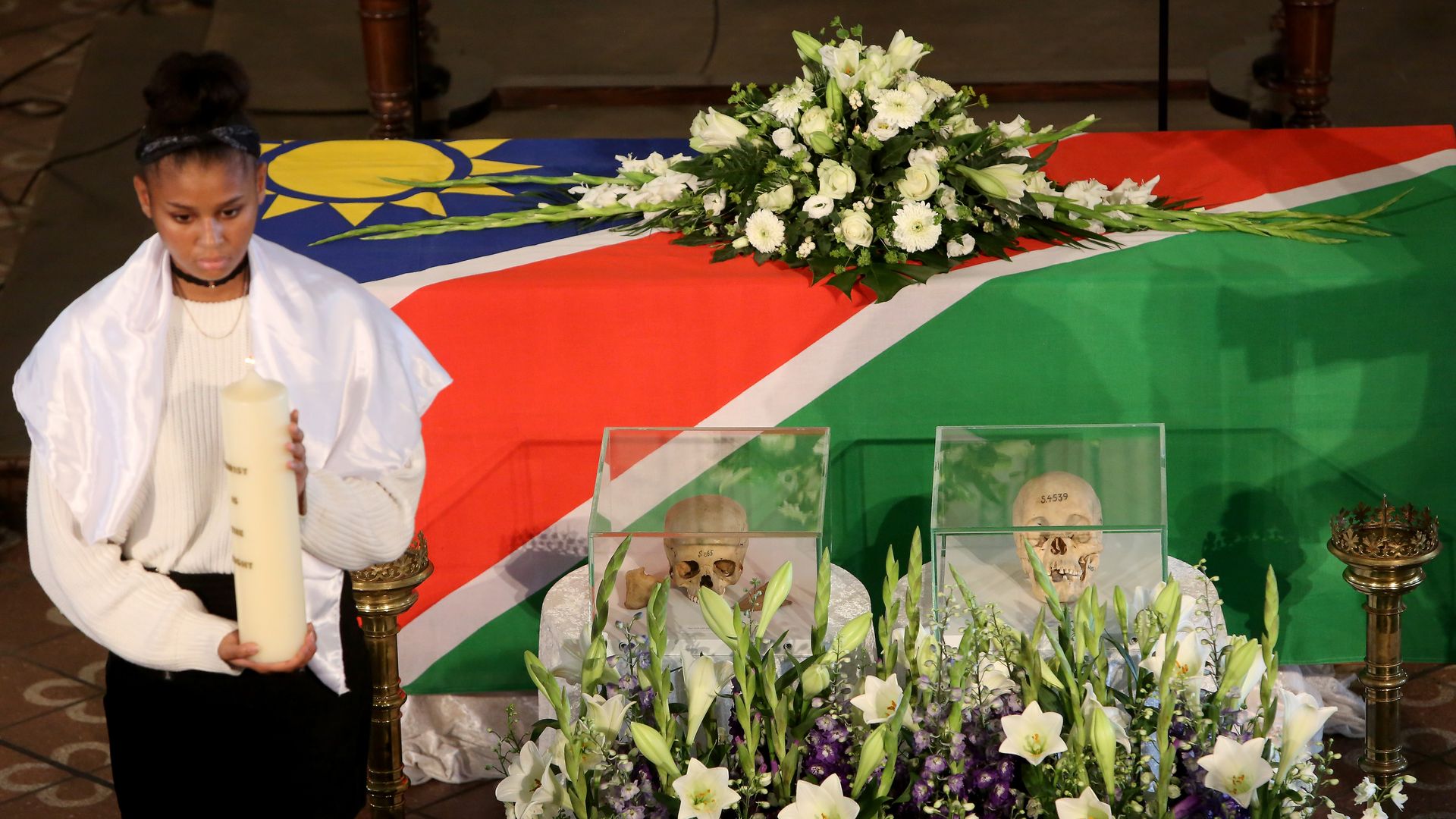Europe confronts its colonial past as movement to return looted relics grows
Add Axios as your preferred source to
see more of our stories on Google.

Germany has been one of the first countries in Europe to commit to returning looted artifacts, holding this 2018 repatriation ceremony in Berlin for Namibian skulls from the German Empire's campaign of 1904-1908 that saw colonizers kill tens of thousands of local people. Photo: Adam Berry/Getty Images
A "new generation of curators" is driving change in museums across Europe as nations confront their violent colonial pasts, University of Oxford contemporary archaeology professor Dan Hicks told Axios.
Why it matters: This year's global anti-racism protests that've seen monuments of colonial figures toppled are helping drive the conversation on returning looted colonial-era relics. Hicks said progress has been too slow for many audiences and stakeholders "who want to see endless dialogue give way to action."
"When the communities we claim to represent start protesting about exhibits, museum curators are most likely getting something wrong."— Dan Hicks
Driving the news: "An open-minded, case-by-case approach to restitution claims is increasingly the norm in European nations," said Hicks, who is among those leading calls to return stolen relics and whose book, "'The Brutish Museums," comes out next month, in an email to Axios Tuesday.
Germany began in 2018 returning skulls stolen during an early 20th century genocide by German colonizers in Namibia, southwest Africa. In March 2019, 16 German states agreed on uniform guidelines for the repatriation of artifacts looted from former colonies.
- One month earlier, the Linden-Museum Stuttgart returned a Bible and whip belonging to Namibian chief Hendrik Witbooi, who died battling German soldiers in 1905.
- This triggered a partnership with Namibian institutions examining lessons from Germany's past, the museum's Martin Otto-Hörbrand said in an email to Axios. It'll hold the "Difficult Heritage" exhibition next month on the issue.
"It was clear to us from the beginning that we wanted to restitute the artifacts and we left the decision on how to do this to the Namibian side."— Otto-Hörbrand
In France, President Emmanuel Macron announced plans in 2018 for "the temporary or permanent restitution of African heritage to Africa."
- His pledge to repatriate 27 colonial-era objects from museums in Benin and Senegal has been slowly proceeding through the French parliament. The National Assembly voted in favor of legislating this earlier this month.
- Similar laws have already passed, including one to return the remains of 24 Algerians from Paris' Musée de l’Homme, per The Art Newspaper, which cites a 16th century law regarding museum artifacts as "inalienable parts of national heritage."
In the Netherlands, a committee advising the government recommended earlier this month that the country should "demonstrate a willingness to return colonial looted art" to the Caribbean, Suriname and Indonesia.
"In the U.K., there's a major shift under way among museum audiences, who are increasingly asking questions about the provenance of African and other 'world culture' objects on display," said Hicks, who curates the University of Oxford's Pitt Rivers Museum.
- "As in other European nations, Britain is beginning to come to terms with the incidents of extreme violence and cultural desecration which accompanied the so-called 'Scramble for Africa' in the final years of late 19th century."
- Some U.K. museums remain resistant to artifact repatriation — notably the British Museum, whose director told the BBC he believes long-term loans of stolen treasures are "a better way forward."
The bottom line, per Hicks: "We've never needed world culture museums more than we do today — as public spaces where we celebrate art and creativity beyond the conventional Eurocentric lens. But let's also imagine a world culture museum where nothing is stolen.
- "Returning violently stolen sacred and royal objects, or human remains, to their rightful owners and descendant communities isn't iconoclasm, or an attack on museums — it's how we're going to make our museums fit for the 21st century."
